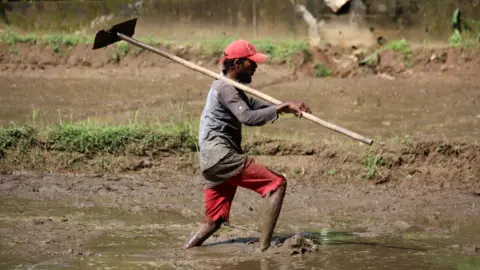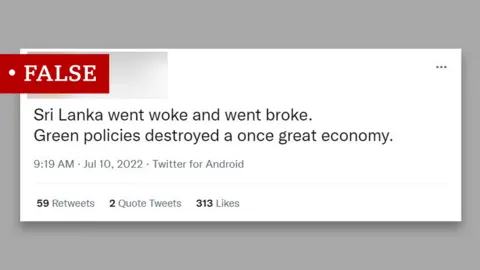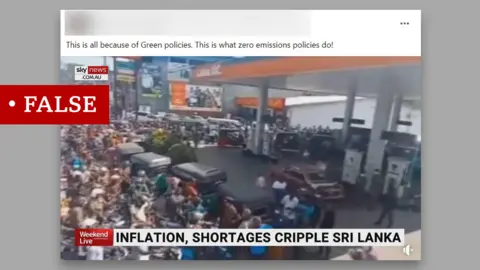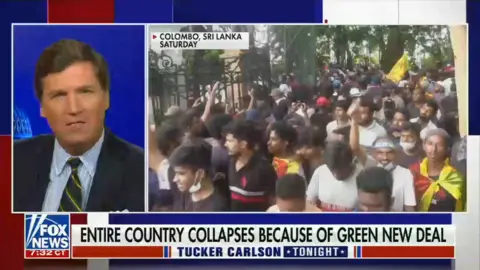Sri Lanka: Is a push for organic behind the country's unrest?
 Reuters
ReutersClaims green policies and "eco-tyranny" lie behind the political crisis in Sri Lanka have been spreading online - but is there any truth to them?
Rising prices, along with food and fuel shortages, have made life difficult for many - and the protests have been going on for months.
But this week, as protesters stormed the president's palace, hundreds on social media - many climate-change sceptics - blamed "green policies".
 Twitter
TwitterOthers said the protests were a popular uprising against an "eco-tyranny" led by shadowy globalist forces.
 Telegram
TelegramBut experts say this is a distortion of the facts.
Where do the claims come from?
Social-media users highlighted Sri Lanka's decision, in April 2021, to ban imports of chemical fertilisers, pesticides and herbicides.
President Gotabaya Rajapaksa vowed to completely eliminate the use of chemical fertilisers in Sri Lanka - something no country has achieved - to protect people's health and the environment.
"This appeared to be an out-of-the-blue, whimsical approach," Charu Lata Hogg, an associate fellow with the Asia-Pacific programme of think tank Chatham House, says.
"It had nothing to do with his commitment towards an environmentally sound, principled position."
Dr Thiruni Kelegama, a lecturer in South Asian studies, at the University of Oxford, says: "He more or less imposed that ban overnight.
"Farmers were not really allowed any kind of time or resources to transition to organic practices."
Crop yields were smaller than usual, food prices rose and shortages of key staples were soon reported.
The government dropped the policy, just seven months after introducing it, following widespread protests.
 Facebook
FacebookBut this week, as the presidential palace was stormed, many were quick to blame this old policy - and this claim was picked up by some right-wing US and UK media outlets and politicians, as well as climate-change sceptics.
 Fox News
Fox NewsWhat is really behind the unrest?
Sri Lanka is facing its worst economic crisis in decades.
And while banning chemical fertilisers indisputably hurt the economy, experts say several other factors contributed.
"Reducing this to the organic-farmer debate is actually reducing a huge struggle that the whole country is going through to one short-lived economic policy," Dr Kelegama says.
"This very much comes down to the very bad economic policies that the president and his family have been putting in place for a long time."
The government itself blames dwindling numbers of tourists due to the Covid pandemic.
The country lost one of its most important sources of foreign currency, which it needs to pay for imports.
But that problem is not new.
In 2009, at the end of its civil war, Sri Lanka focused on providing goods to its domestic market rather than boosting foreign trade, experts say.
Income from exports remained low, while the bill for imports kept growing.
As foreign-currency reserves ran lower, it became increasingly difficult to pay for essential imports, such as fuel or medicine.
And big tax cuts, a $51bn (£39bn) foreign debt, and major infrastructure spending have put further pressure on the country's finances.
Do you have a story for me? Get in touch.
